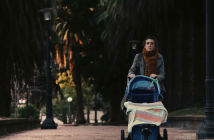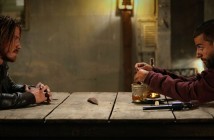
Cast: Grégoire Colin, Alice Houri, Jacques Nolot
Director: Claire Denis
Country: France
Genre: Drama
Editor’s Notes: The following review is part of our coverage for TIFF’s Objects of Desire: The Cinema of Claire Denis which runs from October 11th to November 10th at TIFF Bell Lightbox. For more information on upcoming TIFF film series visit http://tiff.net and follow TIFF on Twitter at @TIFF_NET.
Nénette and Boni is arguably a sequel to U.S. Go Home (1994), Claire Denis’ contribution to the French television series Tous les garcons et les filles de leur age (1993), for several reasons. One, the themes of adolescence and explorations of the body, intimacy, and desire between men and women—in a romantic, sexual sense between someone and his/her object of desire, and a fraternal, platonic sense between siblings. In U.S. Go Home, teenage siblings Alain and Martine end up attending the same party, he dancing with his girl and she in pursuit of losing her virginity to ‘catch up’ with her friend who confides to her early in the film that she has had sex. These situations are stitched together by a corporeal contemplation on longing, understanding one’s emotions and those of others through disillusionment, and a growing sense of responsibility and making choices. Two, the young lead actors Grégoire Colin and Alice Houri as the brother and sister. Once Denis made U.S. Go Home with Colin and Houri, she felt that their film collaboration had not yet been adamantly fulfilled. Thus, she made Nénette and Boni with them playing the titular, estranged siblings who reencounter each other.
…the sensual and sensitive beauty of the film springs precisely from Nénette and Boni’s unbridled, rash decisions, desires, and quirks as individuals and as siblings.
U.S. Go Home’s emphasis on the corporeal and contemplative to represent adolescent longing, understanding and disillusionment, and forging a sense of responsibility also continues in Nénette and Boni. The film begins with fragments of Nénette and Boni’s separate yet equally diaphanous lives, she first presented floating face-up in a swimming pool, shot from overhead, calm and unstressed, and he in the passenger seat of a car that races around in a circle, kinetic and senseless. Such scenes betray their youth, and subsequent scenes betray their lack of responsibility.

At the outset, Nénette reveals her rebellious streak and irresponsibility when she flees her boarding school early in the film. He does the same by spending an inordinate amount of time fantasising about the baker’s wife (Valéria Bruni-Tedeschi), while living in disarray in his mother’s house and managing a pizza truck according to his whims. Further irresponsibility on both their parts manifests itself when Nénette suddenly shows up at Boni’s to stay, he rejecting her presence and she pregnant and undecided.
But the sensual and sensitive beauty of the film springs precisely from Nénette and Boni’s unbridled, rash decisions, desires, and quirks as individuals and as siblings. Denis presents Nénette and Boni in a highly affectionate and curious manner while remaining nonjudgmental towards their troubled situations and relationship with each other. They may lack responsibility in a social sense to each other as siblings, but at the same time, they are absolutely in control of their individual desires, be it in Nénette’s decision to escape the boarding school and her father or in Boni’s all-consuming indulgence in his sexual fantasies of the baker’s wife and trying to forge a life of his own, financially and emotionally speaking.
In this regard, the first sequence of Boni’s fantasy of the baker’s wife in his room, shirtless and narrating to himself a sexual scenario, is both comical and thoughtful in its frank revelation of Boni’s emotional hues and sexual im/maturity (ditto for a later sequence involving Boni and some pizza dough). Concluding this fantasy sequence is the brilliant aural element of the sounds of coffee brewing, which initially could be taken for human moans. The following scene operates hilariously like a parody of the proverbial ‘morning after,’ with Boni waking up and caressing his sexual accomplice at his bedside: his new coffee maker.
Denis sprinkles random shots of immigrants throughout Nénette and Boni’s parallel and eventually intersecting trajectories, as if to stand in for the city’s diversity without actually showing city spaces.
The siblings’ first reencounter with each other in the film is also tempered by the corporeal and intimate, such physical closeness continuing that found between the siblings in U.S. Go Home (in which they hold each other in a tight embrace as they slow dance at the party). Having been let into Boni’s place by one of his friends, Nénette surprises Boni in his bed as he is about to masturbate and initiate another sexual fantasy. Also reinforcing the siblings’ awkward, ambiguous, yet affectionate relationship in its intimacy is their small, physical tangle on the terrace as well as the notebook drawing of ‘Nénette and Boni’ by the former in the latter’s notebook. This same notebook contains Boni’s scribblings of sexual scenarios with the baker’s wife, a subtle detail that expresses how their relationship constantly blurs the lines between romantic/sexual and fraternal/platonic. Further blurring these lines is the scene with Nénette’s doctor (Alex Descas), who thinks that they are husband and wife; neither of them corrects him.
Nénette and Boni’s relationship is a constant mixture of softness and roughness, a delicate and fragile creature, especially because of their youth.
The dynamic of their relationship transforms ever so unassumingly and pushes them to grow up in the world that much more quickly, as they confront a host of situations: their father’s eventual search for Nénette and attempts to reconcile with both of them; Boni’s face-to-face encounter with the baker’s wife (who significantly speaks to him of pheromones and the chemical reaction between men and women while ignorant of his feelings for her); and above all Nénette’s advancing pregnancy and their divergent reactions to it, resulting in an unexpected act on Boni’s part.
Also contributing, albeit obliquely, to the film’s energy is the port city setting of Marseille. Denis sprinkles random shots of immigrants throughout Nénette and Boni’s parallel and eventually intersecting trajectories, as if to stand in for the city’s diversity without actually showing city spaces. Indeed, these random shots signify an alternative market and cultural flow of bodies, arms smuggling, and stealing/selling phone cards that briefly come into contact with Nénette and Boni, providing an intriguing, larger context in which to locate their insular lives.
[notification type=”star”]89/100 ~ GREAT. Denis presents Nénette and Boni in a highly affectionate and curious manner while remaining nonjudgmental towards their troubled situations and relationship with each other. They may lack responsibility in a social sense to each other as siblings, but at the same time, they are absolutely in control of their individual desires.[/notification]



